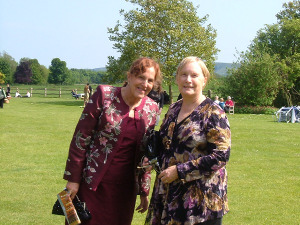Tuesday, May 18, 2004
THE WEDDING
Many Americans may be unaware that the Crown Prince of Denmark has just married an Australian girl. The event got big coverage in much of Europe (and, of course, in Australia) and was even well-covered in China, but I believe that American coverage was minimal. I guess Americans are not too keen on Royalty. Was there a revolution or something? Australia is a monarchy, however, and I have always been a strong monarchist so I found it interesting and pleasing that the wedding got a lot of coverage around the world. Who says that monarchy is an anachronistic irrelevance? If it is, how come so many people watched a wedding in an ancient European monarchy? It was a beautiful show too, of course. Lots of Australian women in particular were absolutely glued to their TVs while it was all happening. So much nicer than watching anything to do with Iraq.
And, if I have any readers in Scotland, I would be pleased to hear whether I guess right in thinking that the wedding would have got blanket coverage in Scotland too. Why? Well, quite apart from normal Scottish sentimentality, the father of the bride is a Scotsman with a Scottish accent who wore the kilt for the occasion! There would have been not a dry eye in many Scottish homes, I think. I felt a bit teary myself, given my Scottish heritage.
And the wedding is another example of how pervasive the Australian diaspora is in the world. I think most people are aware of the big Australian presence in Hollywood these days and people who take an interest in business will be aware that Australians run both Coca Cola and McDonald's, but having an Australian as the future Queen of Denmark does rather set the seal on what a large and successful diaspora it is. And, unlike most diasporas, Australians are not driven abroad by poverty, warfare, persecution etc. They are just adventurous.
Saturday, May 1, 2004
THE THIRTY-NINE ARTICLES
A minor eccentricity of mine is that I find amusement in a lot of things that most others don't find amusing at all. For instance I find Mein Kampf an amusing read -- because you can open it almost at random and be struck not only by what a good Leftist of his day Hitler sounds but also by what a good Leftist he was even in modern terms -- as I have previously pointed out here.
Another text I get a kick out of is about as unlikely as you can get: The "39 Articles of Religion" of the Church of England. To this day all Anglican priests have to swear that they agree with them before they can be ordained. They are the original definition of Anglicanism and go back to 1571. The main reason I enjoy them is that so many of them are very plain-spoken. They conspicuously lack the waffle, obfuscation and infinite compromise that characterizes the Church of England and its daughter churches of today. Note a few of them below. All conservatives should like the last two I quote. The meaning of some words has of course changed a bit over the centuries. "Fond", for instance, meant "deluded" in the 16th century. So being "fond" of someone originally meant being crazy about them! And a "fond hope" was a crazy hope.
The Romish doctrine concerning Purgatory, Pardons, worshipping and adoration as well of Images as of Relics, and also Invocation of Saints, is a fond thing vainly invented, and grounded upon no warranty of Scripture; but rather repugnant to the word of God.
It is a thing plainly repugnant to the word of God and the custom of the primitive Church, to have public prayer in the Church, or to minister the sacraments in a tongue not understanded of the people.
The Cup of the Lord is not to be denied to the lay people; for both parts of the Lord's sacrament, by Christ's ordinance and commandment, ought to be ministered to all Christian men alike.
Bishops, Priests, and Deacons are not commanded by God's laws either to vow the estate of single life or to abstain from marriage. Therefore it is lawful also for them, as for all other Christian men, to marry at their own discretion, as they shall judge the same to serve better to godliness.
The Bishop of Rome hath no jurisdiction in this realm of England. The Laws of the Realm may punish Christian men with death for heinous and grievous offences. It is lawful for Christian men at the commandment of the Magistrate to wear weapons and serve in the wars.
The riches and goods of Christians are not common, as touching the right, title, and possession of the same, as certain Anabaptists do falsely boast; notwithstanding every man ought of such things as he possesseth liberally to give alms to the poor, according to his ability.
It is the English of over 400 years ago but I still think it is hard to beat for plain-speaking: Most refreshing in the present era of political correctness. There was no worry then that they might make someone feel "uncomfortable".
And the simplicity and clarity of the wording does not stem from simple-mindedness on the part of those who wrote the 39 articles. Where they feel a need to get theological -- on the difficult doctrine of predestination (Article 17), for instance -- they are as complex as any modern theologian.
Subscribe to:
Posts (Atom)




































